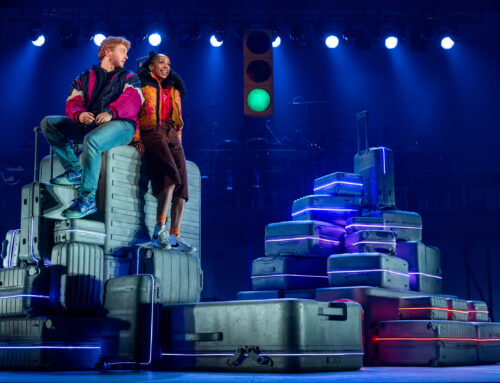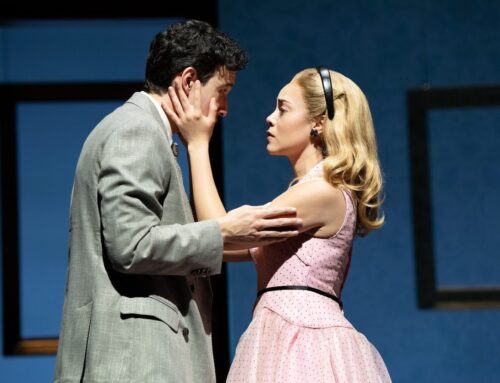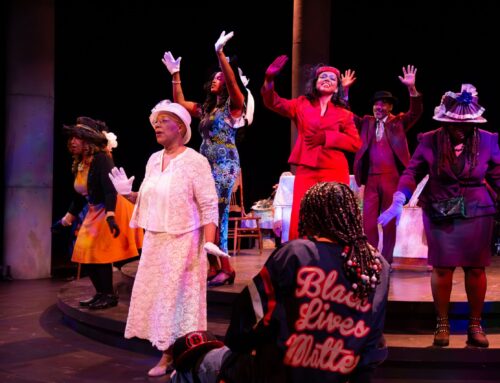Begin the new year by seeing the powerful, complex, vividly staged and imagined INVISIBLE MAN. Ralph Ellison’s towering novel of a black man’s struggle for identity has been brilliantly adapted for the stage by Oren Jacoby. Every word is taken from Ellison’s masterpiece, acutely and imaginatively directed by Christopher McElroen who has channeled the metaphorically rich language of the novel into an acclaimed piece of theater, here presented by Huntington Theatre Company–starring Teagle F. Bougere in a titanic performance.
He stands center stage and utters the production’s and the novel’s first line– “I am an invisible man.” The man is never named; his identity is in constant flux. As in the novel, the ceiling of the stage is covered with bulbs–1,369 in all; laced with electricity and ready for maximum illumination, the invisible man is about to turn a light on his underground lair and what we have not clearly seen: the black experience in America.
In the next three hours, we will witness one idealistic young African-American’s journey from his birthplace in the deep south to his disillusionment as he heads northward to Harlem, struggling to establish an identity. His initial betrayal by his own Negro college is soon echoed by the less obvious treachery of the insidiously divided north, where a menial job at the “Optic White” paint factory literally blows up in his face.
Wounded and whited out– like a negative of white America– lobotomized and on the way to obliteration, his talents are soon co-opted by a white brotherhood set on his eradication. We are not surprised when the action culminates in a race riot– the explosion of centuries of corrosiveness in a deeply conflicted America, divided against itself, a conundrum of power, class, and race, within and without the black community.
There are layers of lenses through which to peer– the way the American black man sees himself, and the way he sees himself through the eyes of the dominant white culture, something called W.E. B. Du Bois’ called “double-consciousness.” It encapsulates the confusion: how does one become oneself–when he is two? How does one remain black and powerful, without sacrificing that self to the larger white power structure which has shaped the black identity? At the same time, a black man has the advantage of “second sight”– awareness of how he is seen.
In fact, the set design echoes this “double-sight” with giant video screens multi-purposed for still and moving images, sometimes transparent, sometimes the source of additional two-dimensional characters, and always making visible what is in the invisible man’s imagination which is ultimately the genesis of his identity as he relives his story before our eyes. Theater is often clumsy about video, using it literally or as a gimmick. The projections here by Alex Koch are the most fully effective use of the medium I’ve ever seen onstage.
And what of the actors? This is a sublimely versatile and potent cast in multiple roles: Johnny Lee Davenport, McKinley Belcher III, Brian D. Coats and Jeremiah Kissell who puts a nasty sheen on the veneer of congeniality purveyed by characters as various as the cruel and controlling MC, the cordial but distant Emerson, and the ultimately smarmy Brother Jack.
Finally there is Teagel F. Bougere as an Invisible Man. He is everyman, fluidly moving from one state of consciousness to another, innocent and striving, confused and angry, eloquent and embittered, thoroughly immersed as narrator and protagonist, inside and outside the action. It’s a soul-searing performance which ultimately takes the spirit by storm. At the end of the play, when he leaps into the audience and stands among us, we understand that our histories, black and white, are inextricably linked; this is not just his story– it is ours.
DO NOT MISS INVISIBLE MAN at the Huntington Theatre through February 3.






Leave A Comment
You must be logged in to post a comment.